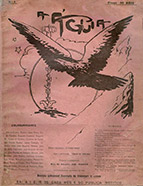

................................
The debate between Pascoaes and António Sérgio, explored through a series of articles published in A Águia between October 1912 and July 1914, reveals the coexistence of diverse cultural and civic orientations. This discourse helps to illuminate the historical and philosophical underpinnings of the Portuguese Renaissance and the magazine itself. António Sérgio, who criticised the 'humanly inexplicable phrases' and the poetic, even 'absurd,' aspects of Pascoaes' philosophy (“Regeneração e tradição moral e económica”, Águia, series II, issue 25, Janeiro 1914, p. 7), approached national issues from a more rationalist perspective. António Sérgio recognised that the root causes of Portugal’s decline were moral, and he agreed that education should be a priority. However, he advocated for scientific and technical education, which he saw as essential for fostering progress. He argued that moral progress depended on economic advancement and on a country’s capacity to industrialise or reform critical sectors like agriculture. Like Raul Proença, another regular contributor to A Águia , Sérgio emphasised the urgency of connecting Portuguese society with the modern world and with key developments abroad. A few years later, he continued to stress the necessity of imitating developed nations like England and Germany if the Portuguese wished to combat their cultural isolation and “general ignorance of spirit” (“Alguns capítulos da legislação agrária do Reino Unido que convém conhecer em Portugal”, Idem , Issue 88-90, April-June 1919, pp. 148-155). In contrast to Pascoaes (and other key figures of the Portuguese Renaissance, such as Jaime Cortesão), Sérgio believed that the desired national regeneration would not emerge from invoking history or rediscovering the “Lusitanian soul,” as it was not the energies of the past that would energise the present (“Regeneração e tradição, moral e economia”, Idem , Issue 25, January 1914, p. 6). Even regarding history education, he opposed the historicism and nationalist prestige prevalent in Portugal, arguing that the past should not be a barrier to progress. Instead, he advocated a historical discipline that would develop critical faculties without veering into apologetics (Sérgio Campos Matos, “A Renascença Portuguesa - consciência histórica e intervenção cívica: 1911-1914”). Other contributors to the magazine, such as the engineer Ezequiel de Campos — also a member of Seara Nova [New Harvest] since its founding — shared these views. Ezequiel de Campos even authored Pela Espanha [For Spain] published by the Portuguese Renaissance in 1916, with the goal of emphasising that Portugal, lagging in so many respects, had much to learn from Spain, particularly in its approach to labour organisation. To summarise the two seemingly opposing perspectives on Portugal’s rebirth: for Teixeira de Pascoaes, it was vital to awaken popular consciousness to the meaning and value of being Portuguese by immersing it in ancient traditions that celebrated the achievements of the Lusitanian race (while not neglecting the modern European spirit).
This work is financed by national funds through FCT - Foundation for Science and Technology, I.P, in the scope of the projects UIDB/04311/2020 and UIDP/04311/2020.
